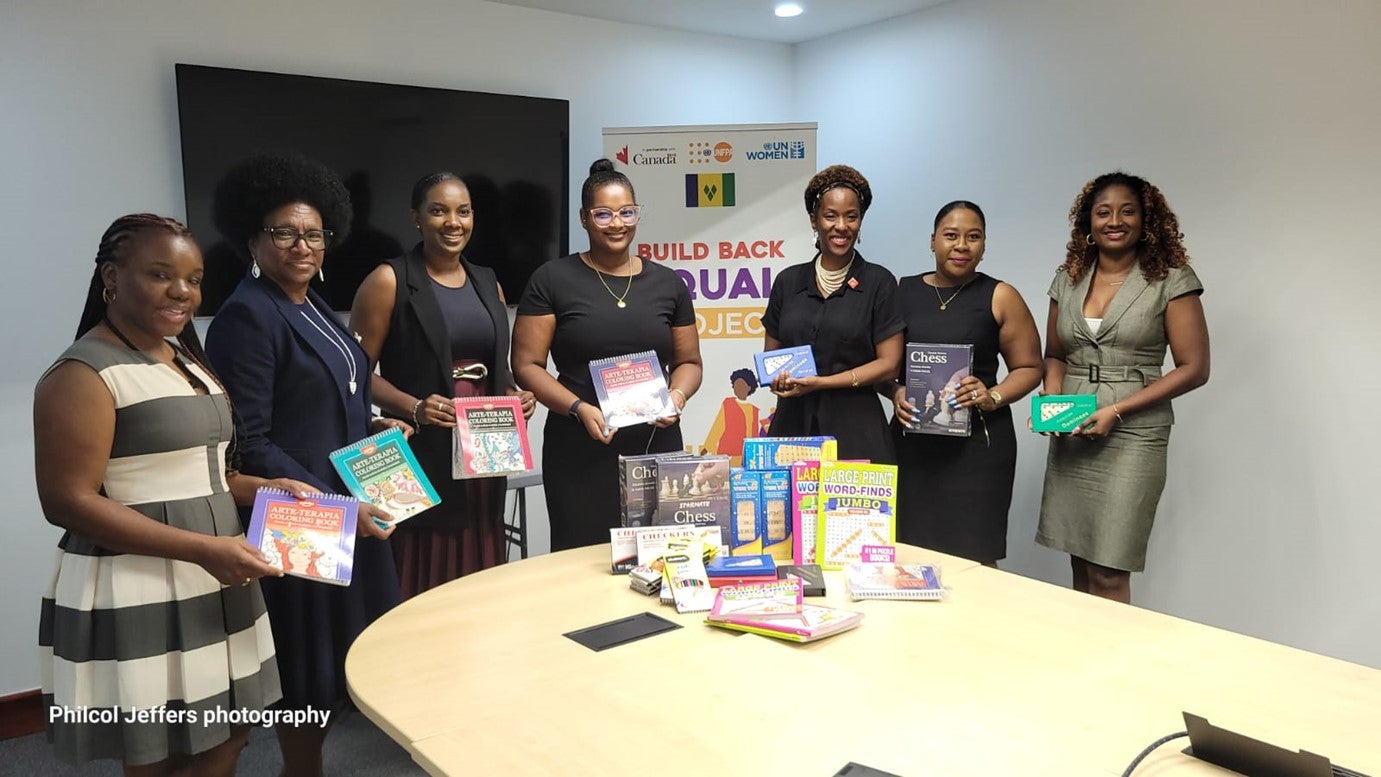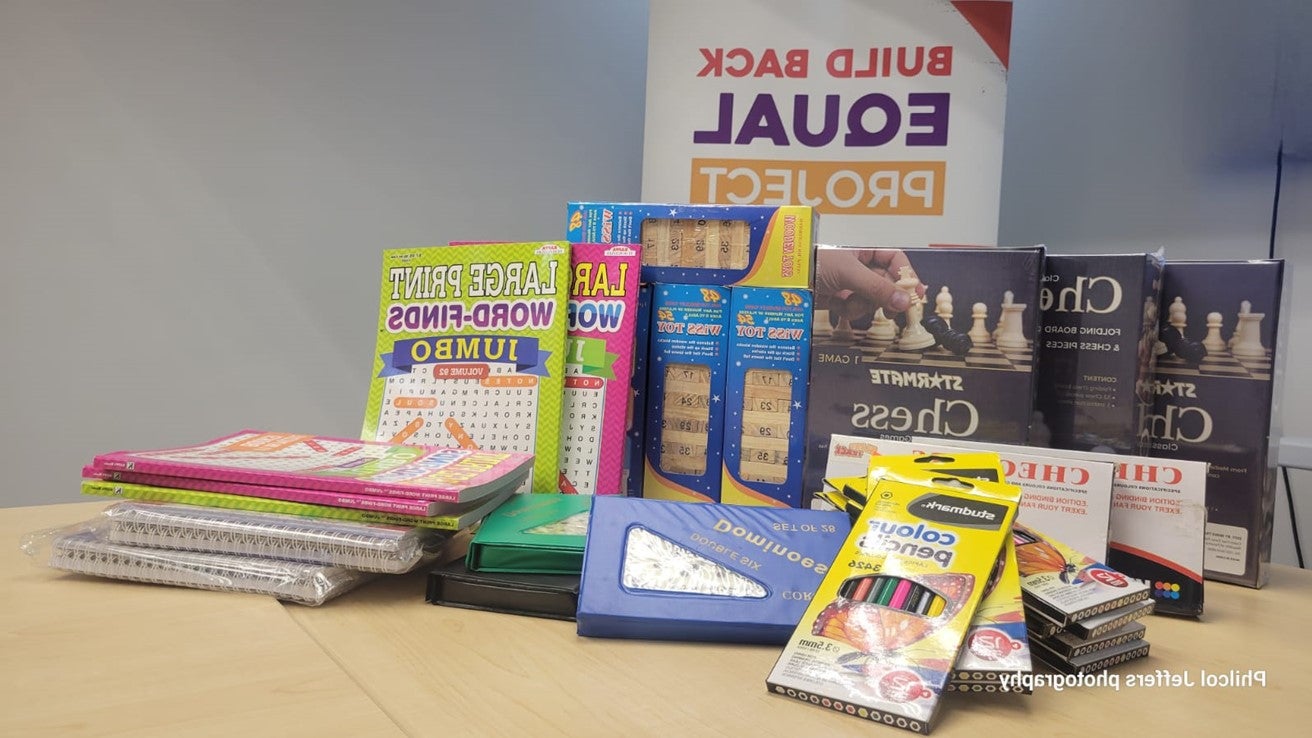Build Back Equal and UN Women provide mental health tools to the Mental Health, Psychosocial Support Technical Working Group, Ministry of Health in St. Vincent and the Grenadines
Date:

L-R: Loveness Nyakujarah, Programme Specialist, Gender Equality, BBE Project Coordinator, Julie Douglas Russell -Senior Nursing Officer- Community Services, MoH, Roselle Solomon- Co-Chair MHPSSTWG, MoH, Ellica Matthews- Co-Chair MHPSS TWG, MoH, Tonni Brodber- Representative UN Women MCO – Caribbean, Jemima George-Richardson - Coordinator, Gender Affairs Division, Rhema Lewis - BBE PCA - UN Women MCO - Caribbean
KINGSTOWN, ST. VINCENT – The 2024 Hurricane Season has officially ended, but those who were severely impacted still need focused support including mental and psychosocial support.
The Mental Health, Psychosocial Support Technical Working Group (MHPSS TWG) within the Ministry of Health is now better equipped to respond to the needs of persons displaced by Hurricane Beryl and the first responders who continue to serve in the wake of the multiple crises in St. Vincent and the Grenadines. This is thanks to the provision of tools for the roll out of the ‘How Yuh Feeling?’ project through the support of the Build Back Equal Project funded by Global Affairs Canada.
UN Women Multi-Country Office (MCO) - Caribbean is partnering with the Ministry of Health to provide innovative and community focused psychosocial support services. The severe disruption of normalcy in the immediate aftermath of Hurricane Beryl, and uncertainty that people faced about their future and their capacity to rebuild their homes, lives and businesses, led to stress and emotional challenges.
Vulnerable groups, such as women, children, the elderly, and persons with disabilities, face heightened protection risks including gender-based violence (GBV) and greater difficulties in accessing disrupted basic services, during times of hazards and emergencies.
The current gap in the MHPSS response lies in reaching the needs of dispersed and hard-to-reach populations. Mobile teams will be deployed in extending MHPSS services to individuals and communities who may not have easy access to centralised services.
Roselle Solomon, Co-Chair MHPSS TWG said: “Since Hurricane Beryl we have seen a number of things, we have seen anger, sadness and depression… even now if it starts to rain, if the winds blow a little too hard, person are affected. Persons have been taking it one day at a time and are trying to navigate. In addition to that, with people reaching out, we realise there are persons who have gone undiagnosed who needed the service.”
Representing the Ministry of Health, Julie Douglas Russell, Senior Nursing Officer- Community Services, commended “the incredible yet gruelling work” first responders continue to provide to residents of the Grenadine islands. She noted that the health care workers remained at the duty stations while their own homes had been destroyed to care for those in need. She reiterated the desperate need for first responders to receive mental health support, as the carers also need to be cared for.
Tonni Brodber, Representative, UN Women Multi-Country Office- Caribbean acknowledged the critical need for the project, commending the staff for their dedication noting they too are individually impacted. She hopes the initiative can demonstrate to other territories that such a programme should be in place before a crisis:
“We are working with our partners to continue this type of investment. This work needs to be happening in good times and bad. We are responding to a hurricane now, but there are other moments of crisis in people’s lives every day that they are struggling through. We want to see this work continue and scaled... to demonstrate how successful it has been, and what more can be done, when we hear from those who have been helped.”
The project will strengthen capacity for PSS personnel through provision of counsellors who will use The Caribbean Self-Care toolkit: Skills to help you live from a place of wellness in times of Crisis and Disaster as the framework for programmes and activities with persons directly impacted and first responders.
Post-disaster, mental health and psycho-social support are integral to helping individuals and communities recover from hurricanes as they support affected populations in regaining a sense of control and empowerment in their lives.
During the recent handover, there was a central theme by the partners in attendance as they acknowledged the need for culturally relevant interventions that would encompass a variety of mental health tools such the use of games, sports and other tactile methods that can foster social connection and engagement, which are essential for rebuilding mental resilience and creating a sense of community and are an accessible way for men and youth to manage stress and process emotions, serving as an effective alternative to traditional talk therapy.
By engaging in games and creative activities, individuals can experience relaxation and relief without needing to articulate difficult feelings, which can be particularly helpful for those who may feel uncomfortable with or resistant to verbal therapy.
